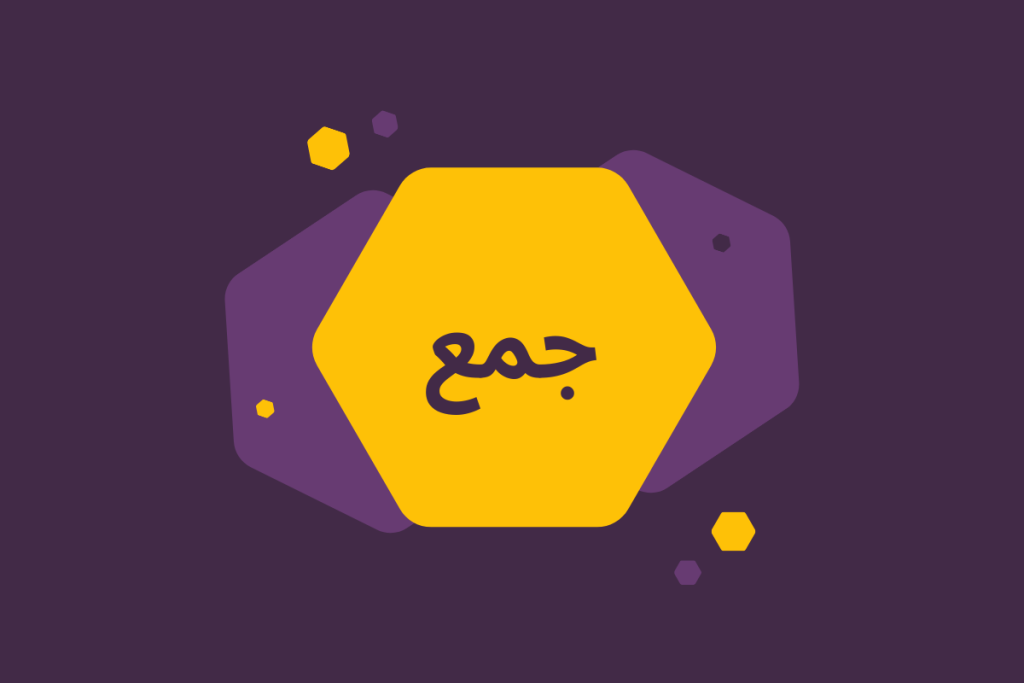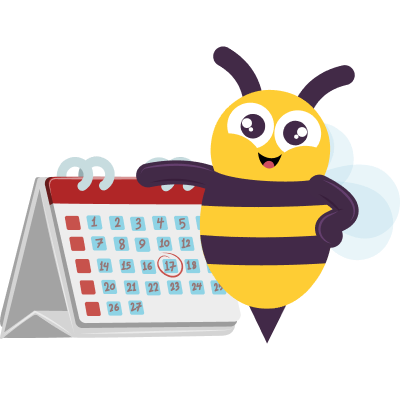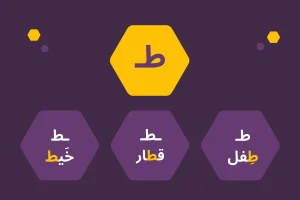
Verb of the Day
Jamaʻa
جَمَعَ
Welcome to our verb series Verb of the Day and another useful Arabic verb.
Today’s verb is جَمع /Jamaʻa/
It’s another verb that is widely used in different everyday situations.
We will share with you the different meanings the verb has as well as its conjugations with the Arabic pronouns.
We will also provide you with derivations, opposites, and synonyms of the verb and show the different uses in the context of meaningful sentences.
Are you ready?
Main Meaning
The verb جَمَعَ has five main meanings:
Joining things together
The first meaning refers to the action of joining, gathering, or collecting things together, as in the following examples:
He gathered books and pens into a bag
Jamaʻa alkutuba wālʼaqlāma fī alḥaqybti
جَمَعَ الكُتُبَ والأَقلامَ في الحَقيبةِ
He gathered scattered papers
Jamaʻa alʼawrāqa almushattatata
جَمَعَ الأَوْرَاقَ الْمُشَتَّتَةَ
Combining two traits
The second meaning has a slightly different meaning, which essentially means “to add” or “to combine” two things, usually traits.
He combined the two best things (He added goodness to goodness).
Jamaʻa bayna alḥusnayayni
جَمَعَ بَيْنَ الحُسْنَيَيْنِ
Unifying multiple things
The third meaning does not use the literal meaning of the verb.
It refers to the metaphorical “bringing together” of two or more opposing forces or things.
He brought hearts together (He gathered or united them with love and harmony).
Jamaʻa alqulūba
جَمَعَ القُلُوبَ
Writing a book
The fourth meaning is only used with books to indicate the action of writing or authoring a book.
Using the verb جَمَعَ in this context could refer to the action of collecting information that is part of writing books and that is inherent in the verb جمع (to collect).
He wrote (assembled) a book.
Jamʻa alkitāba
جَمعَ الكِتابَ
Mobilizing armies
The fifth meaning is connected to war and the battlefield. It refers to the action of preparing or bringing together soldiers and armies ahead of battle.
People are preparing to confront their enemies (They are mobilizing and preparing for battle).
Jamʻ alqwmu lʼaʻdāʼhm
جمع القومُ لأَعدائهم
Verb Conjugation with Pronouns
English
Transcription
Arabic
I collected
Anā jamaʻtu
أَنا جَمَعتُ
I collect
Anā ajmaʻu
أَنا أَجمَعُ
We collected
Naḥnu jamaʻnā
نَحنُ جَمَعنا
We collect
Naḥnu najmaʻu
نَحنُ نَجمَعُ
He collected
Huwa jamaʻa
هُوَ جَمَعَ
He collects
Huwa yajmaʻu
هُوَ يَجمَعُ
They collected (P/M/3rd P)
Hum jamʻwā
هُم جَمعوا
They collect (P/M/3rd P)
Hum yajmaʻwn
هُم يَجمَعون
She collected
Hya jamaʻat
هيَ جَمَعَتْ
She collects
Hya tajmaʻu
هيَ تَجمَعُ
They collected (P/F/3rd P)
Hunna jamaʻna
هُنّ جَمعنَ
They collect (P/F/3rd P)
Hunna yajmaʻna
هُنّ يَجمَعنَ
You collected (S/2nd P)
Anta jamaʻta
أنتَ جَمَعتَ
You collect (S/2nd P)
Anta tajmaʻu
أنتَ تَجمَعُ
You collected (P/2nd P.)
Antum jamaʻtum
أنتُم جَمَعتُم
You collect (P/2nd P.)
Antum tajmʻwn
أَنتُم تَجمعونَ
You collected (S/F/2nd P.)
Anti jamaʻti
أنتِ جَمَعتِ
You collect (S/F/2nd P.)
Anti tajmaʻyn
أنتِ تَجمَعينَ
You collected (P/F/2nd P.)
Antunna jamʻtunaa
أَنتُنَّ جَمعتُنَّ
You collect (P/F/2nd P.)
Antunna tajmaʻna
أَنتُنّ تَجمَعنَ
You collected (D/2nd P.)
Antumā jamʻtumā
أَنتما جَمعتُما
You collect (D/2nd P.)
Antumā tajmʻāni
أَنتما تَجمعانِ
They collected (D/M/3rd P.)
Humā jamaʻā
هُما جَمَعا
They collect (D/M/3rd P.)
Humā yajmaʻāni
هُما يَجمَعانِ
*P: Plural S: Singular D: Dual F: Feminine M: Masculine
Verb in the Quran
Now, our blogs cannot be as valuable as we want them to be without providing you with examples of the verb جَمَع in the Quran. One of the examples we would like to share with you is using the verb جَمَع to mean “to collect money”
Let’s look at the following verse from the Holy Quran:
Waylun liikulii humazatin luumazatin ** alldhy jamaʻa mālan wʻdaadah
وَيْلٌ لِّكُلِّ هُمَزَةٍ لُّمَزَةٍ * الّذي جَمَعَ مالًا وعدَّده (الهُمَزَة 1-2 )
“Woe unto every slanderer, fault-finder! * [Woe unto him] who amasses wealth and counts it a safeguard“ (Surat Al-Humaza: Verses 1 – 2)
The verse is warning the person who finds faults in others and amasses and collects wealth because such a person wrongly thinks that his wealth will make him eternal and immortal.
Verb in poetry
Now let’s see how the verb is used in poetry. In the following line, the verb جمع is also used to collect material wealth.
أَنفَعُ في البَيتِ مِنَ الخُبزِ
ما جَمَعَ الناسُ لِدُنياهُمُ
Mā jamaʻa alnāsu lidunyāhumu anfaʻu fī albayti mina alkhubzi
The most important thing in people’s lives is to collect bread in their homes.
The poet emphasizes the significance of having bread in homes, reflecting on their challenging living conditions.
More Examples
There are other similar meanings to use the verb جمع and they can be seen in the following examples:
I gather my friends for food.
Anā ajmaʻu aṣidqāʼy llṭṭʻām.
أَنا أجمَعُ أَصِدقائي للطّعام
You collect old stamps and coins.
Antumā tajmaʻāni alṭaawābiʻa wālʻumlāti alqadīmti
أنتُما تَجمَعانِ الطَّوابِعَ والعُملاتِ القَدِيمةَ
Did you collect the cost of clothes?
Hal jamaʻtum thamana almalābisi?
هل جَمَعتُم ثَمَنَ المَلابِسِ؟
Word Derivations
Numerous words in Arabic can be derived from the word root جمع:
Word Root ج – م – ع
Meeting
Ijtimāʻ
اِجتِماع
Society
Mujtamaʻ
مُجتَمَع
Club
Jamʻīyah
جمعِيَّة
Friday
Jumʻah
جُمعة
Congregation
Jamun
جَمعٌ
Mosque
Jāmiʻ
جامِع
Group
Majmūʻah
مَجمُوعة
University
Jāmiʻah
جامِعة
Synonyms
One of the synonyms of the verb جَمَعَ /Jamaʻa/ in the sense of “adding” and adding things to each other is the following verbs:
to combine
Ḍamma
ضَمَ
to add
Aḍāfa
أَضافَ
Example 1
He combined both money and wisdom.
Jamaʻa almāla maʻa alḥikmati
جَمَعَ المالَ مَعَ الحِكمَةِ
He added wisdom to money, meaning he had both.
Aḍāfa ilá almāli alḥikmta
أَضافَ إلى المالِ الحِكمةَ
Example 2
She combined pearls in a string.
Jamaʻt ḥabaaāta allluʼlʼi fī khayṭin
جَمَعتْ حَبَّاتَ اللُّؤلؤِ في خَيطٍ
She added pearls in a string.
Ḍamaat ḥabaaāta allluʼlʼi fī khayṭin
ضَمَّتْ حَبَّاتَ اللُّؤلؤِ في خَيطٍ
Opposites
The verb جَمَعَ /Jamaʻa/ has two main opposites. Let’s look at them and see them in examples:
to separate
Farraqa
فَرَّقَ
to put apart
Bāʻada
باعَدَ
Examples
Love has gathered people, but money has separated them.
Jamʻaa alḥubbu alnaaāsa wfaraaq baynahum almālu
جَمعَ الحُبُّ النَّاسَ وفَرَّق بَينَهُم المالُ.
You collect the books in the library and you don’t put them apart.
Tajmaʻyna alkutba fī almkatabti wa-lā tbāʻdyna baynahā
تَجمَعينَ الكُتبَ في المكَتَبةِ ولا تباعدينَ بينها
Conclusion
Now before we conclude our blog, we would like to remind you to check our special planner that you can use to speed up your learning journey. This planner offers a rich 30-page worksheet accompanied by over 200 practical exercises and activities. It will serve as a powerful tool to back your acquired knowledge and newly learned language and push your learning journey forward with tons of practice opportunities.
If you liked our verb for today, make sure to learn other verbs from our Verb of the Day series, and download our app to enhance your knowledge with the needed practice through a wide variety of interactive and engaging exercises.





